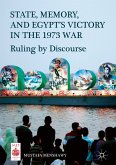This book sets out to explain the variation in nations' reactions to their defeats in war. Typically, we observe two broad reactions to defeat: an inward-oriented response that accepts defeat as a reality and utilizes it as an opportunity for a new beginning, and an outward-oriented one that rejects defeat and invests national energies in restoring what was lost-most likely by force. This volume argues that although defeats in wars are humiliating experiences, those sentiments do not necessarily trigger aggressive nationalism, empower radical parties, and create revisionist foreign policy. Post-defeat, radicalization will be actualized only if it is filtered through three variables: national self-images (inflated or realistic), political parties (strong or weak), and international opportunities and constraints. The author tests this theory on four detailed case studies, Egypt (1967), Turkey/Ottoman Empire, Hungary and Bulgaria (WWI), and Islamic fundamentalism.
Ibrahim M. Zabad is Associate Professor of Political Science and Director of the International Studies program at St. Bonaventure University, USA.
Dieser Download kann aus rechtlichen Gründen nur mit Rechnungsadresse in A, B, BG, CY, CZ, D, DK, EW, E, FIN, F, GR, HR, H, IRL, I, LT, L, LR, M, NL, PL, P, R, S, SLO, SK ausgeliefert werden.









